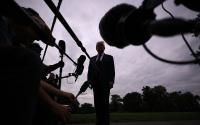By Street, Paul29 January 2010
The news of Howard Zinn's death hit me like a ton of bricks. I did not expect to cry and then about 10 minutes after getting the e-mail...it hit me - three times. The last time I looked down and saw that I was standing in my den about one foot away from one of my old "instructors' copies" of Zinn's masterpiece, A People's History of the United States, 1492-Present. "I Don't Take Him Very Seriously" This morning tears gave way to a bit of disgust, thanks to the New York Times and the Associated Press (AP). Even in death the great critics of the rich and powerful have to be put in their place. The Times pulled its initial obituary of Zinn off the Associated Press (AP) wire. "Even liberal historians were uneasy with Professor Zinn," the AP reported, quoting the former Kennedy administration court historian Arthur M. Schlesinger Jr. "I know he regards me as a dangerous reactionary," Schlesinger once said, according to the AP." And I don't take him very seriously. He's a polemicist, not a historian." It was quite an insult to include that condescending dismissal from an academic power-elite aristocrat like Schlesinger. Yes, Arthur M. Schlesinger, who wrote the following in his history A Thousand Days: "1962 had not been a bad year...aggression [was] checked in Vietnam." Nineteen sixty-two was, as Zinn's friend and ally Noam Chomsky noted in 1984, "the year in which the U.S. undertook direct aggression against South Vietnam....Orwell would have been impressed" by Schlesinger's comment, Chomsky added. Arthur M. Schlesinger, who, in an early memo to his idol the arch-militarist president John Fitzgerald Kennedy said that the problem with Cuba was "the spread [throughout Latin America] of the Castro idea of taking things into your own hands and demanding the opportunity for a decent living, all of this stimulated by the Soviet Union, which is presenting itself as a model for modernization in one generation." (The Cuban peoples' revolution threatened to inspire fellow Latin Americans to follow the dreaded "Soviet" example by modernizing on their own behalf, without structuring their societies in ways calculated to complement the industrial economies of the leading Western states - what horrors!) Howard Zinn was an American giant. He made vapid servants of power like Schlesinger and the New York Times' managers look like moral and intellectual ants by comparison "Exactly the Same Limited Vision" "Even" liberal historians were "uneasy" - goodness! Try "especially" liberal historians! Zinn brilliantly skewered Schlesinger and others liberal historians' narrow world view and their claims to enlightened progressiveness. The liberals claimed thought they discovered deep democratic and progressive content in the actions and values of such blood-soaked ruling class operatives as Andrew Jackson, Theodore Roosevelt, Woodrow Wilson, Franklin Roosevelt, Harry Truman, and John Kennedy. Zinn saw through the liberal illusion and showed how all of them (along with their Republican counterparts) were morally crippled by "exactly the same limited vision [Richard] Hofstader talked about [in his 1949 book The American Political Tradition] - a capitalist encouragement of enormous fortunes alongside desperate poverty, a nationalistic acceptance of war and preparation for war. Government power swung from Republicans to Democrats and back again," Zinn wrote, "but neither party showed itself capable of going beyond that vision." And Zinn updated the story to include Lyndon Baines Johnson, Jimmy Carter, and Bill Clinton. We can be sure he would have applied to Barack Obama as well in a future edition of A People's History. "Before and After Those Two Minutes" I did not spend last night listening to the vapid, power-serving, and centrist oratory of corprate war president Barack Obama's "State of the Union Address." I reflected instead on the radical lessons and vision of Zinn, who noted the following as (what he called) "the election madness" that captivated so many progressives during the last great "quadrennial electoral extravaganza" (Chomsky's excellent phrase): "The election frenzy seizes the country every four years because we have all been brought up to believe that voting is crucial in determining our destiny, that the most important act a citizen can engage in is to go to the polls and choose one of the two mediocrities who have already been chosen for us." "...Would I support one candidate against another? Yes, for two minutes-the amount of time it takes to pull the lever down in the voting booth." "But before and after those two minutes, our time, our energy, should be spent in educating, agitating, organizing our fellow citizens in the workplace, in the neighborhood, in the schools....." "Let's remember that even when there is a 'better' candidate...that difference will not mean anything unless the power of the people asserts itself in ways that the occupant of the White House will find it dangerous to ignore.....Today, we can be sure that the Democratic Party, unless it faces a popular upsurge, will not move off center. The two leading Presidential candidates have made it clear that if elected, they will not bring an immediate end to the Iraq War, or institute a system of free health care for all." "They offer no radical change from the status quo. They do not propose what the present desperation of people cries out for: a government guarantee of jobs to everyone who needs one, a minimum income for every household, housing relief to everyone who faces eviction or foreclosure. They do not suggest the deep cuts in the military budget or the radical changes in the tax system that would free billions, even trillions, for social programs to transform the way we live." "None of this should surprise us. The Democratic Party has broken with its historic conservatism, its pandering to the rich, its predilection for war, only when it has encountered rebellion from below, as in the Thirties and the Sixties" (Howard Zinn, "Election Madness," The Progressive, March 2008). Who can deny the wisdom of this classic Zinn passage as we move into the second year of the militantly corporate and imperial, Wall Street-captive Obama administration? Ruling Class Criminals and Popular Struggle Zinn's widely beloved People's History (which I used to assign in college level American History surveys) was among other things a masterful chronicle of American bipartisan ruling class criminality. From the brutal ethnic cleansing of native Americans and the rise of indentured servitude and mass black chattel slavery through the building of an industrial capitalist edifice for the exploitation of millions of immigrant and native workers to the terrible, mass-murderous transgressions of the U.S. military empire in the Philippines, Haiti, Mexico, Japan, Indochina, Serbia and Iraq and more, Zinn forthrightly detailed the sins and corruption of power. But Zinn (who was said to have offered undergraduate students course credit for seeking to engage the historical process, for acting to change history) was hardly content just to chronicle the monumental offenses of elites. His justly fabled volume was loaded with inspiring stories of lower and working class resistance and radical-democratic struggle from the bottom up. From indentured servants and slaves who joined in Bacon's Rebellion in colonial Virginia through the slaves who rose against the chattel system before and during the Civil War through the great labor union and socialist struggles of the late 19th and early 20th centuries and later popular campaigns (including the 1930s industrial workers movement, the Civil Rights Movement, the feminist and antiwar movements and more) to the present, Zinn's People's History was no tragic tale of simple top-down victimization. It told a story of rugged, often bloody conflict in which ordinary people repeatedly engaged their masters and shaped history from below. Zinn had little interest in the quasi-anthropological field of so-called "social history" that focused in fake-egalitarian ways on the minute life-ways, "ethno-cultures" and local communities of working and lower class people, seen in deceptive isolation from their struggle with the rich and powerful. Zinn had no time for such academic drivel. From a working-class background himself, he was concerned with the recurrent pattern of conflict pitting the ruling class and its many servants against the broad mass of "ordinary" working people and their allies among defectors from the middle and upper class. Zinn's "people's history" did not leave out the ruling class. It treated the working and lower classes as agents and actors, not subjects for clinical "new social history" dissection or "post-modern" derision. "The Students Are Not Permitted to Cite Zinn's Works" Last night on my Facebook page a young progressive activist I know made the following post: "Obama and the Democrats should ask themselves: W[hat] W[ould] H[oward] Z[inn] D[o]?" It was a friendly statement I sort of liked (even if it had nothing whatsoever to do with what the top Democrats are actually all about). A snotty commenter I'll call Jack wrote, "You mean write a book leftists will like, right?" I dashed off a quick response: "Jack, that book (People's History of U.S.) was admired and loved by many who were not leftists. I know, I assigned it for many years in mass U.S history surveys and it was extremely popular with people from all sorts of perspectives...still is, I'm told." This prompted the young progressive activist (the original poster) to add the following: "People's History changed academic history and historical scholarship, it was a major contribution to the field regardless of political ideology..." The activist was wrong. Zinn's People's History was and is a great and transcendent volume in many ways but it wasn't about that at all and it didn't do what the activist said. It was a beloved and inspiring book for the people and was often assigned by a minority of left/New Left professors in the U.S. history surveys (also by a lot of high school history teachers - more remarkable in my opinion). But no, it did not really "change academic history and historical scholarship." I know. I was a neo-New Left U.S. historian-to-be before finally fleeing academia with the words of a drunken liberal department chair ringing in my ears: "we don't need any more Howard Zinns." I say this with no sense of disrespect. Howard Zinn did not give a damn about most academic history/historians [1] and the professional historians were fairly disdainful in return on the whole. There's very little primary source research and no real methodological innovation in A People's History. I'm not sure how much time Zinn spent in archives after his early days in academia. He synthesized secondary sources in a way that made history come alive for general readers and for many undergraduates. It was the story he told and the beauty of his words and his compellingly lyrical analysis from a very Left perspective that set his work apart, along with the sweep and reach. But the profession of history was not really changed much if at all by Zinn and one of the reasons I (who once spent a lot of time in archives) got out is that academic history lost interest in telling bigger and broader synthetic stories -- that and their pathetic reluctance to make relevant progressive and contemporary political connections between past, present, and future Speaking of academia's response to Zinn, here is another tidbit from my Facebook Page, courtesy of a very progressive schoolteacher named Terry D. in New Jersey: "Just yesterday I was speaking with colleague/friend about Howard Zinn. This colleague is a young middle-school history teacher currently enrolled in a master's program in history." "Before entering the master's program, he was a big fan of the work of both Zinn and Chomsky. In fact, it was he who loaned me his copy of Zinn's 'People's History just a few years ago. " "In his history master's program the students are not permitted to cite Zinn's work for their papers. They are taught that Zinn is a 'generalist' and not credible. He told me that Zinn's work is not viewed as 'pure' but with an angle --- that his work is slanted because he has written about selective aspects of history. He said it lacks balance." "He said the same thing about Chomsky." "This program is teaching him that for someone to be considered a valid and credible 'historian' one has to show all sides of an issue or segment of history (balanced) and sources must be well-cited. He said Zinn's work does not meet this criteria." "This young man was pro-Zinn/ pro-Chomsky before the program....and now he is moving away from their work." "I think it is the university's way to keep the ideas of Zinn and Chomsky OUT of the curriculum and to change thinking/minds." "Look what it did to him." What a pathetic little story from the front lines of the corporatization of higher education, where many of my former fellow leftists from graduate schools are marooned until retirement, never to be heard from again in any relevant political way! I'm quite sure that Terri D's tale is true-to-life. God save us from the tenured professors. At least 90 percent of them just spend their lives obeying the rich and powerful and modeling supine surrender. They don't do their jobs and so the late Howard Zinn and Noam (Chomsky) and a few others have had to do it for them. Academia needs a lot more Howard Zinns. "Ye Are Many; They Are Few!" As the fake-progressive, not-so "liberal" Obama's latest shining yet strangely mediocre speechifying blared across the nation's Telescreens last night, I was led to reflect on the wisdom of Howard Zinn's elementary but powerful observation that a "better" politician in the White House "will not mean anything unless the power of the people asserts itself in ways that the occupant of the White House will find it dangerous to ignore." So true! No honest and informed progressive can deny the wisdom of that remark as we move into the second year of the Obama administration - an epitome of Zinn's dark judgment on the "limited vision" of U.S. political culture past and present. It's up to us to write and act out the other great theme in A People's History - popular resistance on a large scale, informed by the wisdom of Shelley, who Zinn quoted at the end of the Afterword to the 2003 edition of A People's History: Rise like lions after slumberIn unvanquished number!Shake your chains to earth like dewWhich in sleep had fallen on you - Ye are many; they are few! Note 1. Here is an entertaining anecdote from ex-academic historian Staughton Lynd: "Howard Zinn's trajectory was similar. Although he made his living as an academic, he seemed entirely indifferent to academia. I recall that when he first recruited me to join him at Spellman College, I, fresh out of graduate school, asked Howard what papers he was working on to present at which conferences of historians. He looked at me as if I were speaking a foreign language. He was one of two adult advisers to the Student Nonviolent Coordinating Committee, and his head was into recording their experience and participating in their actions and strategy." Staughton Lynd and Andrej Grubacic, Wobblies and Zapatistas: Conversations on Marxism, Anarchism, and Radical History (Oakland, CA: PM Press 2008), 65-66.






